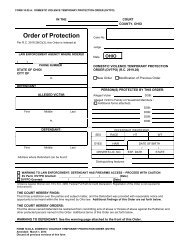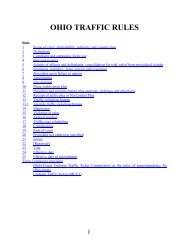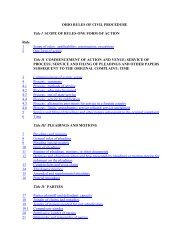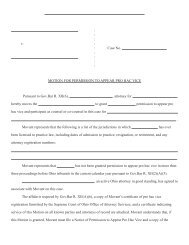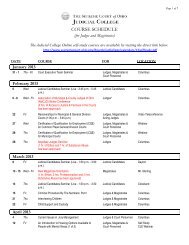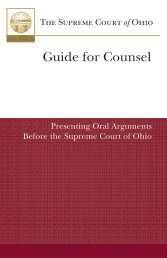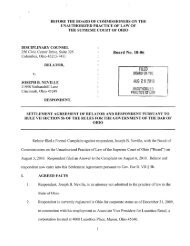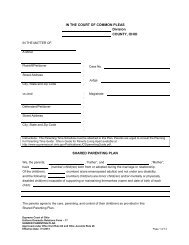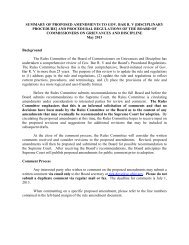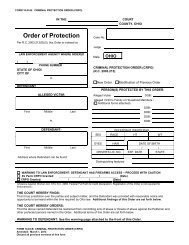disciplinary handbook: volume v - Supreme Court - State of Ohio
disciplinary handbook: volume v - Supreme Court - State of Ohio
disciplinary handbook: volume v - Supreme Court - State of Ohio
You also want an ePaper? Increase the reach of your titles
YUMPU automatically turns print PDFs into web optimized ePapers that Google loves.
Harwood, Cincinnati Bar Assn. v.125 <strong>Ohio</strong> St.3d 31, 2010-<strong>Ohio</strong>-1466. Decided 4/7/2010.Case Summaries- 114Respondent disregarded his duty to exercise independent pr<strong>of</strong>essional judgment on behalf <strong>of</strong> clients who werefacing foreclosure and failed to inform his clients that he did not maintain pr<strong>of</strong>essional- liability insurance.Respondent and relator entered into a consent-to-discipline agreement. Respondent, a sole practitioner, workedfrom home, from the beginning <strong>of</strong> August 2008 through the end <strong>of</strong> January 2009 and failed to inform any <strong>of</strong>the clients he did not maintain pr<strong>of</strong>essional liability insurance. In September 2008, respondent accepted aposition with American Foreclosure Pr<strong>of</strong>essionals, Inc., and Foreclosure Assistance USA, Inc. (―foreclosurecompanies.‖) The foreclosure companies solicited persons facing foreclosure and representing they couldsave their homes by negotiating with a lender. The foreclosure companies referred clients from <strong>Ohio</strong>, WestVirginia and California to respondent, who had signed a document agreeing to the procedures that theforeclosure companies expected him to follow in the representation <strong>of</strong> their customers. The companies chargedbetween $900 and $1200 which included the legal representation arranged by and paid for, in part, by thecompanies. The companies asked the customers to execute a request for legal services and forwarded therequest and contact information to respondent who received $100 to file an answer in each case. Usuallymore than a month before filing an answer, respondent sent each client a letter asking them to contact himregarding whether they contested the alleged mortgage payment default and had any defenses. If no answer,respond sent another status letter repeated the question and sending a copy <strong>of</strong> an answer denying theforeclosure allegations. If a motion <strong>of</strong> summary judgment were filed, he would send another letter with acopy <strong>of</strong> the motion, again asking if they had any defense and he warned them that if they did not he had nobasis to defend and the court would enter a judgment against the client. If the client did not respond to theletter, he did not oppose the motion or appear. If he received a notice that summary judgment had beenentered, he sent a letters to the clients notifying them <strong>of</strong> the judgment, the scheduling <strong>of</strong> a sheriff‘s sale andthe concluding steps <strong>of</strong> foreclosure. He explained they should contact the foreclosure company concerningnegotiation with the lender. He did not participate in negotiations with the lender. Respondent voluntarilyterminated his relationship with the foreclosure companies in January 2009; terminated his relationship withthe referred client having a pending or open matter; and sought leave to withdraw from all pending cases.That same month the <strong>Ohio</strong> Attorney General filed a complaint against the foreclosure company, alleging interalia, violations <strong>of</strong> the <strong>Ohio</strong> Consumer Sales Practice Act. None <strong>of</strong> the foreclosure employees are admitted tothe practice <strong>of</strong> law. The panel and board accepted the consent-to-discipline agreement <strong>of</strong> violations <strong>of</strong>Pr<strong>of</strong>.Cond.R. 1.1, 1.3, 1.4(c), 5.4(a), and 5.5(a) and a six-month, stayed suspension. In aggravation, therewas a pattern <strong>of</strong> multiple <strong>of</strong>fenses against vulnerable clients. BCGD Proc.Reg. 10(B)(1)(c), (d), and (h). Inmitigation, there was no prior <strong>disciplinary</strong> record, a lack <strong>of</strong> a dishonest or selfish motive, a timely effort torectify the situation, and full cooperation. BCGD Proc.Reg. 10(B)(2)(a), (b), (c), and (d). In addition, hereported his misconduct and he no longer engages in private practice. He works as a staff attorney for a court<strong>of</strong> appeals judge in Kentucky. The court has considered <strong>disciplinary</strong> cases where a lawyer enters a jointarrangement with an attorney company to represent clients in mortgage-foreclosure proceedings and sanctionshave ranged from a public reprimand for an inexperienced attorney to a stayed suspension for moreexperienced attorneys to a partially stayed suspension for other attorneys: Patterson (2009), Willard (2009),Palombaro (2009), and Mullaney (2008). The <strong>Court</strong> noted that the failings <strong>of</strong> these associations likerespondent‘s alliances signal a surrender <strong>of</strong> the attorney‘s ability to exercise independent personal judgment ona client‘s behalf. Unlike Patterson who received a partially stayed suspension, respondent had no priordiscipline, but unlike Mullaney, who received a public reprimand, respondent was not a new associateconstrained by the practices at a law firm. The court accepted the consent-to discipline agreement and soordered a six-month stayed suspension.Rules Violated: Pr<strong>of</strong>.Cond.R. 1.1, 1.3, 1.4(c), 5.4(a), 5.5(a)Aggravation: (c), (d), (h)Mitigation: (a), (b), (c), (d)Prior Discipline: NO Procedure/ Process Issues: NO Criminal Conduct: NOPublic Official: NO Sanction: Six-month suspension, stayed



